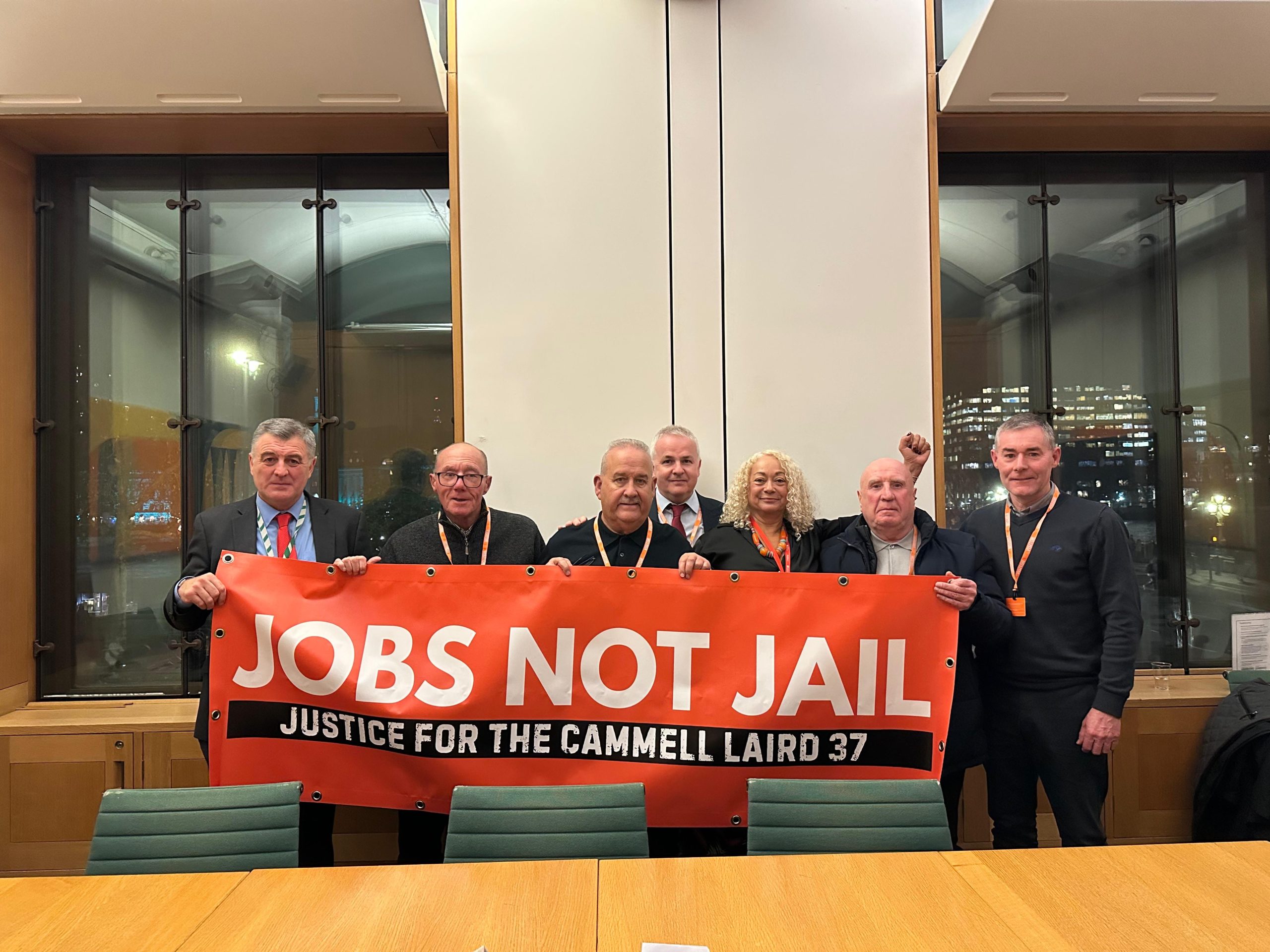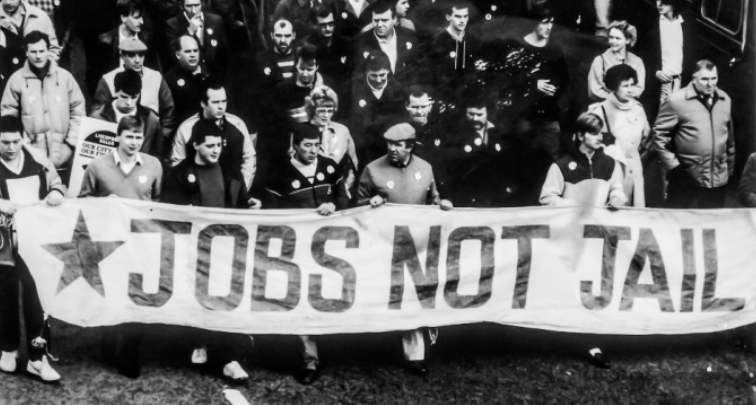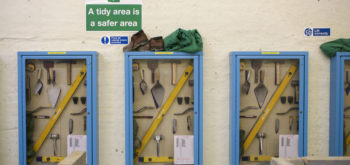A newly reformed campaign could bring a legal challenge against the company that brought action against 37 striking workers in the 1980s. The Cammell Laird 37 were unjustly jailed for protesting against job losses at their Liverpool shipyard.
Despite receiving a commitment from a then government minister in 2024 that the new Labour government were committed to looking into the plight of the Cammell Laird 37, no action has yet been taken.
Heidi Alexander, then Minister of State for Courts and Legal Services, said in July 2024 that the Ministry of Justice ‘will consider and explore options for carrying out a review into these events’.
The Cammell Laird 37 are a group of shipyard workers who were jailed in 1984 after they occupied a gas rig and a Royal Navy ship they were working on in the Cammell Laird yard in Liverpool. By the mid-1980s deindustrialisation was well under way, tens of thousands of jobs had been lost in Liverpool and across the North West. In the summer of 1984 Cammell Laird announced 800 job losses, and 130 workers began their strike, escalating to the occupation of the rig. As the weeks went on the number of strikers dwindled to 37.
When the strike ended the 37 were sent to HMP Walton, Liverpool’s high security prison, to serve 30-day sentences. No other industrial action resulted in so many men being sent to prison. By the time they were released they had lost their redundancy pay, pensions, and were blacklisted, so would struggle to find new work. Officials from the GMB union have estimated the strikers may have lost out on more than £120,000, alongside having to live with the day-to-day impact of their convictions.

Members of the Justice for the Cammell Laird 37 campaign in parliament with former MP Mick Whitely, Ian Byrne MP, Kim Johnson MP, and lawyer, Paul Heron.
An inquiry into the events at Orgreave, the same year as the Cammell Laird dispute, was announced earlier this year. This statutory inquiry will examine the violent clashes between striking miners and police at Orgreave Coking Plant, and the subsequent discredited prosecutions of 95 picketers. The government has said the inquiry has been formed as part of its ‘manifesto commitment to uncover the truth.’
Speaking at a meeting in parliament this week, members of the Justice for the Cammell Laird 37 campaign highlighted the urgency of their renewed call for justice. The brother of Mick Whitley, former MP for Birkenhead, was one of the 37 who has since died before he could get any recompense or clear his name. Whitley tabled a Westminster Hall debate in February 2023 that raised the plight of the 37, but said this week ‘now that the Labour Party are in government, we want those conclusions [from the debate] to be looked at and progressed.’ Kim Johnson MP, Labour MP for Liverpool Riverside and Chair of the All-Party Parliamentary Group on Miscarriages of Justice, likened the case to the Shrewsbury 24, Orgreave, and even Hillsborough, because of the level of state overreach and the failure of working class communities.
A lawyer for the group said that legal action could hinge on two potential grounds, but that engagement from the government is required in order that all the available records relating to the dispute can be tracked down. The potential appeal could focus on the fact that the strikers were never formally dismissed from their jobs. At the original hearing Cammell Laird provided a ‘proforma letter’ they said had been sent to the striking workers dismissing them from their jobs, but none of the letters, or copies, of those that were actually sent have been revealed. Paul Heron, a lawyer for the Public Interest Law Centre, said he thinks it is ‘likely or possible that Cammell Laird’s management deliberately misled the court’.
Another ground relates to the fact that the workers occupied the ship that was on the foreshore, and a British Gas rig, and it is questionable whether either of these were legally in possession of the company. This means Cammell Laird didn’t have the right to take the 37 to task over their purported damage of the property, or for trespassing.
Paul Heron also noted how the pervading culture of the time, in the midst of the miners strikes and Thatcher’s heavy handed retaliations, may have impacted the case. A documentary titled ‘Reds Under the Bed’ which showed violent clashes from picket lines across the country was aired in the middle of the trial, a fact Heron describes as ‘staggering’ when you think about the possible impact on the public and the judiciary.
For the 37 occupiers, the threat was existential. Paul Heron explained: ‘You can understand how desperate people were to keep their jobs, how desperate they were to hold on, not just to their jobs but also, hopefully, to jobs for kids who were going to replace them.’ He said a legal case would be significant for the 37 ‘because there’s potentially owed redundancy payments and potentially pensions and maybe even compensation as well.’ Most significantly though, it would be a chance for them to clear their names, ‘exonerate your name and clear your name. That’s more important than anything else.’
Access to relevant documents has so far been nearly impossible. Lawrence Turner MP described it as ‘remarkable’ how little documentation there is about the strike and the legal case: ‘Police records, justice records, Department for Trade records, they are not there’. He added that all of the archives of the British shipbuilders appear to be lost, ‘or at least the official account is they are lost’. In trying to track down documentation relating to the 37, he was told that a major cache of documents potentially relating to this case were shipped abroad, and then subsequently lost. Heron said a departmental sweep for relevant documents is now of paramount importance, otherwise it seems the papers ‘have just evaporated’.
As the Orgreave Inquiry is about to get under way, and considering the new Hillsborough Law which imposes a duty of candour on those giving evidence at inquiries and inquests, the campaigners have considered the possibility of calling for a public inquiry into the Cammell Laird dispute. However, time is not on their side. An inquiry would take months or years to come to fruition, and in any case the first task of the inquiry would be to source all the relevant documents, a task that should already be underway by the Ministry of Justice.
The campaign are also patiently awaiting engagement from the GMB union who have previously supported their cause. Financial backing will be essential before any legal challenge is brought, to ensure if it fails the 37 men themselves are not liable for Cammell Laird’s costs.







